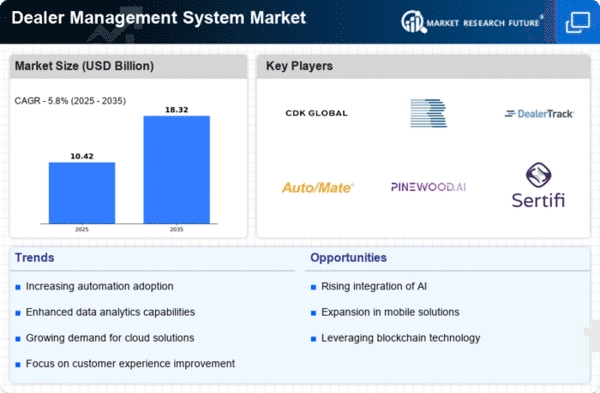Market Growth Projections
The Global Dealer Management System Market Industry is projected to experience substantial growth, with estimates indicating a rise from 10.0 USD Billion in 2024 to 18.3 USD Billion by 2035. This growth trajectory suggests a compound annual growth rate of 5.65% from 2025 to 2035, reflecting the increasing adoption of dealer management systems across various automotive sectors. Factors contributing to this growth include technological advancements, rising demand for automation, and an enhanced focus on customer experience. The market's expansion is indicative of the evolving landscape of the automotive industry and the critical role of effective management systems.
Technological Advancements
The Global Dealer Management System Market Industry is experiencing rapid technological advancements that enhance operational efficiency. Innovations such as cloud computing, artificial intelligence, and machine learning are being integrated into dealer management systems, allowing for real-time data analysis and improved customer relationship management. This shift towards digital solutions is expected to drive the market's growth, as businesses seek to streamline processes and reduce operational costs. The increasing adoption of these technologies is likely to contribute to the market's projected value of 10.0 USD Billion in 2024, reflecting a growing demand for sophisticated management tools.
Rising Demand for Automation
There is a notable rise in demand for automation within the Global Dealer Management System Market Industry. As dealerships strive to enhance productivity and minimize human error, automated systems are becoming essential. Automation facilitates various functions, including inventory management, sales tracking, and customer service, thereby improving overall operational efficiency. This trend is anticipated to propel the market towards a valuation of 10.0 USD Billion in 2024. Furthermore, the expected compound annual growth rate of 5.65% from 2025 to 2035 indicates a sustained interest in automated solutions that can adapt to evolving market needs.
Expansion of Automotive Industry
The expansion of the automotive industry plays a pivotal role in driving the Global Dealer Management System Market Industry. As the automotive sector continues to grow, the demand for efficient management systems becomes increasingly critical. New vehicle models, evolving consumer preferences, and the rise of electric vehicles necessitate robust dealer management solutions to handle complex inventory and sales processes. This growth trajectory is expected to push the market towards a valuation of 10.0 USD Billion in 2024, with a sustained upward trend anticipated as the industry evolves and diversifies.
Regulatory Compliance Requirements
Regulatory compliance requirements are becoming increasingly stringent within the Global Dealer Management System Market Industry. Dealerships must adhere to various regulations concerning data security, financial reporting, and consumer protection. Consequently, dealer management systems are being developed to ensure compliance with these regulations, thus mitigating risks associated with non-compliance. This necessity for adherence is likely to drive market growth, as dealerships seek systems that not only enhance operational efficiency but also safeguard against legal repercussions. The anticipated growth to 18.3 USD Billion by 2035 reflects the importance of compliance in shaping industry standards.
Increased Focus on Customer Experience
The Global Dealer Management System Market Industry is witnessing an increased focus on enhancing customer experience. Dealerships are recognizing that providing exceptional service is crucial for retaining customers and driving sales. As a result, dealer management systems are being designed to offer personalized experiences, streamline communication, and facilitate seamless transactions. This emphasis on customer satisfaction is likely to contribute to the market's growth, with projections indicating a rise to 18.3 USD Billion by 2035. The integration of customer feedback mechanisms within these systems further underscores the industry's commitment to improving service quality.
















